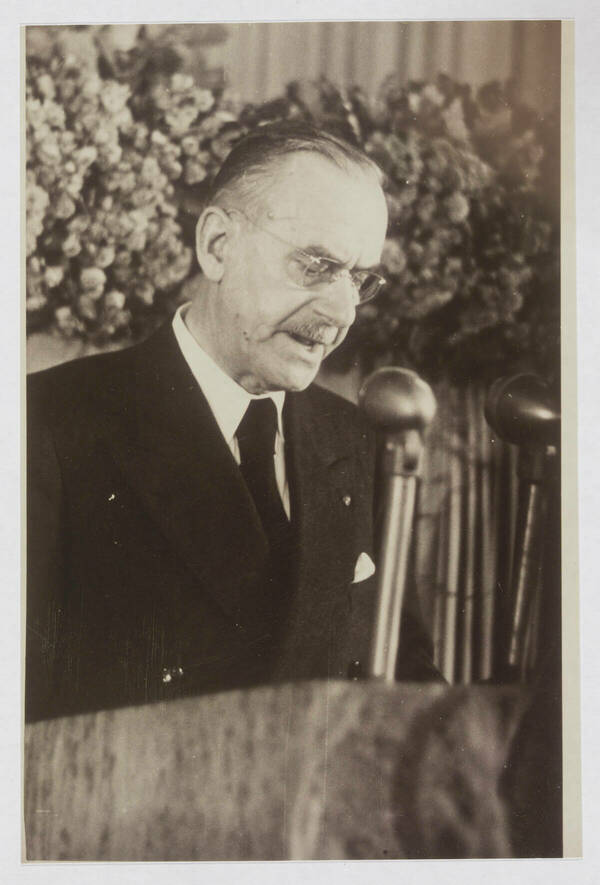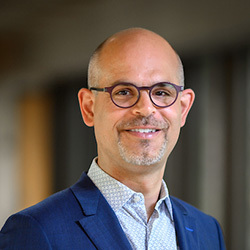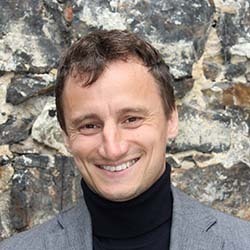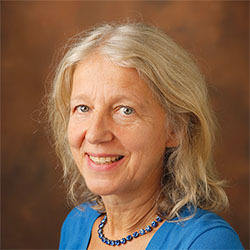
Join the Nanovic Institute for European Studies and the Department of German and Russian Languages and Literatures for an exploration of the themes behind the "Thomas Mann: Democracy Will Win!" exhibit. In this panel discussion to open the exhibit's stay at Notre Dame, three panelists will engage with Mann's public life, legacy, and relevance to contemporary issues. This discussion, which is particularly relevant to the 2023 Notre Dame Forum topic "The Future of Democracy," will seek to find the ways that Mann's resistance to populism and nationalism can inform our own engagement with democracy today.
The panelists and their topics are as follows:
- "Thomas Mann and The Coming Victory of Democracy," presented by Tobias Boes, professor and chair of the Department of German and Russian Languages and Literatures, as well as a Nanovic faculty fellow
- "Thomas Mann and Czechoslovak Democracy," presented by Jan Vondráček, postdoctoral fellow at the Masaryk Institute and Archives of the Czech Academy of Sciences
- "Thomas Mann in Pacific Palisades, 1942/1943," presented by Meike Werner, associate professor of German and European studies, acting chair of the Department of German, Russian and East European Studies, chair of the Department of French & Italian, and director of graduate studies in the Department of German, Russian & East European Studies.
A Q&A session and a walkthrough of the exhibit will follow.
About the Exhibit
"It is a terrible spectacle when the irrational becomes popular," said Thomas Mann in his famous speech at the Library of Congress in 1943. His resistance is inspiring and relevant today as we witness the fundamental values of democracy once again being called into question, and
that populism and nationalism are putting our democratic society under massive pressure. The exhibition "Thomas Mann: Democracy Will Win!" sees itself as a concrete contribution to the current debate on both sides of the Atlantic.
The Thomas Mann House in Pacific Palisades, California forms the spatial and metaphorical center of the exhibition. From this sanctuary in exile, Thomas Mann campaigned for a new understanding of democracy. Today, the house is once again at the service of intellectual exchange and transatlantic understanding.
The first part of the exhibition presents Thomas Mann's political biography in its development from monarchist to powerful opponent of National Socialism and committed fighter for democracy. Photographs, texts, excerpts from the famous radio addresses "To the German Listeners!" and original exhibits trace his intellectual, political, and spatial paths. The second multimedia part connects this history to the present. What makes a political person? How does one become a supporter of democracy? How does one defend one's stance? Examples from the recent past, films and interviews, tweets and quotes from personalities from politics, pop, literature, and society - such as Greta Thunberg or Saša Stanišić, Donald Trump or Barack Obama, Igor Levit or Edward Snowden - illustrate the importance of the question: How can we defend and sustainably strengthen democracy as the only possible form of society? This is a task that is more important than ever today, in times of global migration, climate change, and new pandemics.
The terms Beginnings, Zeitgeist, Affirmation, Take Action, and Responsibility structure the exhibition - and show the ambivalences that even a democratic system cannot eliminate. Thomas Mann's life offers numerous points of departure for examining the state and future of democracy - while adhering to Mann's dictum: "DEMOCRACY WILL WIN!"
About the Speakers

Tobias Boes teaches German Language, Literature, and Culture at the University of Notre Dame, where he also chairs the Department of German and Russian Languages and Literatures. He is the author of the monograph Thomas Mann’s War (2019), which was published in German translation in 2021, and currently working onA Reader’s Guide to Thomas Mann’s “Doctor Faustus,” contracted with Camden House. He was one of the scientific advisors for the traveling show “Thomas Mann: Democracy Will Win!”

Jan Vondráček is a postdoctoral fellow at the Masaryk Institute and Archives of the Czech Academy of Sciences and teaches modern history at Charles University in Prague. His dissertation on local administration and everyday life in the Protectorate of Bohemia and Moravia was recently published in German and Czech. In this context, he is working on a digital history-related project with the Massachusetts Institute of Technology, which builds on his dissertation and focuses on institutional data.

Meike Werner teaches German and European Literature and Culture at Vanderbilt University, where she also serves as Director of the Max Kade Center for German and European Studies. She has published widely on German literature and culture from the eighteenth to the twentieth century, most recently Gruppenbild mit Max Weber (2023). She is the recipient of a number of awards, including Vanderbilt’s Outstanding Graduate Mentor Award, and serves as the president of the American Friends of the German Literature Archive in Marbach.
Originally published at nanovic.nd.edu.